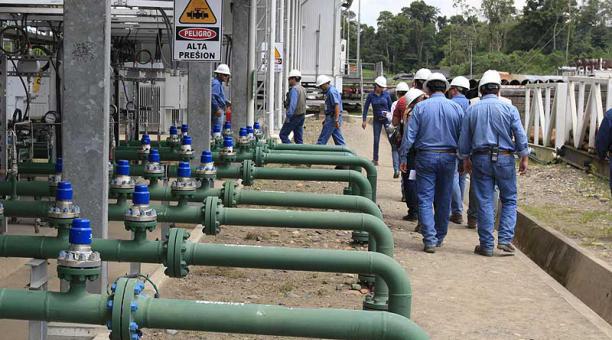
(Fitch, 7.May.2020) — Fitch Ratings has affirmed the senior unsecured notes issued by Empresa Publica de Exploracion y Explotacion de Hidrocarburos Petroamazonas EP (PetroAmazonas) due in November 2020 at ‘C’/’RR4’.
The affirmation reflects the completion of the consent solicitation processing for which the company received valid consents from 98.91% of bondholders. The notes have a total outstanding amount of approximately USD175 million.
The purpose of the solicitation of consents was to amend the senior unsecured notes, which Fitch considers a distressed debt exchange (DDE) as per its DDE criteria. In Fitch’s opinion, the offering imposes to bondholders of the notes a material reduction in the notes’ terms as (i) it seeks to extend the maturity date to Dec. 6, 2021 from Nov. 6, 2020, (ii) establish a new amortization schedule, (iii) reduce the interest amount now scheduled to Sept. 6, 2020 by USD0.5 for each USD1,000 notes and (iv) eliminate cross defaults events arising from certain sovereign notes. The proposed amendments require the affirmative vote of holders of more than 75% of the outstanding aggregate principal amount of the existing notes, in accordance with the existing notes indenture.
The notes are fully covered by a sovereign guarantee, which constitutes a general, direct, unsecured, unsubordinated and unconditional obligation of the sovereign. The guarantee is backed by the full faith and credit of the Republic of Ecuador and ranks equally in terms of priority with other sovereign debt. This linkage reflects PetroAmazonas’ importance to the government of Ecuador as the main supplier of the country’s energy supply and a large contributor of U.S. dollar-linked revenues.
KEY RATING DRIVERS
PetroAmazonas’ senior unsecured notes rating reflect those of Republic of Ecuador as a guarantor. The downgrade of Ecuador’s rating to ‘RD’ on April 20th follows the agreement by commercial bondholders to the government’s “consent solicitation” to defer upcoming bond repayments by four months. Fitch considers this the first step in a distressed debt exchange (DDE) that will have concluded when an intended comprehensive restructuring of these securities is carried out, which normalizes the relationship with the international financial community.
On April 18, the government announced that holders of 10 external bonds totaling USD19.2 billion agreed to the “consent solicitation” initiated on April 8 that will defer approximately USD800 million in upcoming interest payments until August. The authorities have made this request to achieve cash flow relief that could better enable them to attend to the health and economic crisis stemming from the coronavirus pandemic. They plan to use this four-month standstill period to pursue a comprehensive restructuring of those bonds to ensure debt sustainability, as well as a new “successor program” to the existing Extended Fund Facility (EFF) with the IMF.
Fitch considers this change in the terms of existing external bonds a DDE, given that it entails a material reduction in terms for bondholders and was agreed upon to avoid an outright payment default on these securities.
The sovereign’s liquidity position is exceptionally tight, and social and political pressure for relief from external debt service to attend to the domestic crisis has grown considerably. Incentives to seek relief on external debt repayment may also build to mitigate risks to the dollarization regime. Central bank international reserves fell below USD2 billion at the end of March and covered 43% of the reserve requirements of financial institutions, the lowest levels in the past two decades of dollarization. Fitch downgraded Ecuador’s rating to ‘CC’ on March 24 to indicate probable default of some kind as a result of these pressures and to ‘C’ on April 9 when the government initiated the consent solicitation process.
DERIVATION SUMMARY
The linkage of PetroAmazonas’ notes to the sovereign is similar in nature to peers, such as YPF S.A. (CCC), Petroleo Brasileiro S.A. (Petrobras, BB-/Stable), Ecopetrol S.A. (BBB/Negative), Petroleos Mexicanos (BB-/Stable), Petroleos del Peru – Petroperu S.A. (BBB+/Stable) and Empresa Nacional del Petroleo (ENAP, A/Negative). These companies all have strong linkages to their respective sovereigns, given their strategic importance to each country and the potentially significant negative sociopolitical and financial implications their financial distress would have for their countries.
The ‘C’/’RR4’ rating on PetroAmazonas’s notes reflects its close linkage with the sovereign rating of Ecuador due to its strategic importance to the country as one of the largest suppliers of crude oil. Ecuador depends on oil exports as a significant source of hard currency for the country, which historically has represented 50% of the country’s exports. The sovereign linkage is further evidenced by the sovereign guarantee provided to PetroAmazonas to cover its debt obligations under the notes.
KEY ASSUMPTIONS
Fitch’s Key Assumptions Within Its Rating Case for the Issuer
–Senior unsecured notes fully guaranteed by the Republic of Ecuador in 2020;
–Approved budget and consequent government transfers will be enough to cover operating expenses, capex investments and debt service payments.
KEY RECOVERY RATING ASSUMPTIONS
–The recovery analysis assumes that the value of PetroAmazonas would be assessed under a going concern approach;
–Fitch has assumed a 10% administrative claim
RATING SENSITIVITIES
Factors that could, individually or collectively, lead to positive rating action/upgrade:
–An upgrade of the sovereign.
Factors that could lead to a positive rating action on Ecuador:
–Completion of a commercial debt restructuring that Fitch judges to have normalized the relationship with the international financial community.
Factors that could, individually or collectively, lead to negative rating action/downgrade:
–Not Applicable as the ‘C’ rating is the lowest a debt can be rated.
BEST/WORST CASE RATING SCENARIO
International scale credit ratings of Non-Financial Corporate issuers have a best-case rating upgrade scenario (defined as the 99th percentile of rating transitions, measured in a positive direction) of three notches over a three-year rating horizon; and a worst-case rating downgrade scenario (defined as the 99th percentile of rating transitions, measured in a negative direction) of four notches over three years. The complete span of best- and worst-case scenario credit ratings for all rating categories ranges from ‘AAA’ to ‘D’. Best- and worst-case scenario credit ratings are based on historical performance. For more information about the methodology used to determine sector-specific best- and worst-case scenario credit ratings, visit https://www.fitchratings.com/site/re/10111579.
SUMMARY OF FINANCIAL ADJUSTMENTS
Fitch included adjustments to company reported values, mainly associated to revenues. The company does not report any revenues. The Republic of Ecuador has not defined an income model to compensate PetroAmazonas directly for is production efforts. Instead, the majority of PetroAmazonas’ operations are funded through an annual contribution from the Ministry of Finance in an amount equal to the General Budget approved by the board of directors. Given that this is the main source of income for the company, Fitch adjusted these contributions and reflected them as revenues.
***

